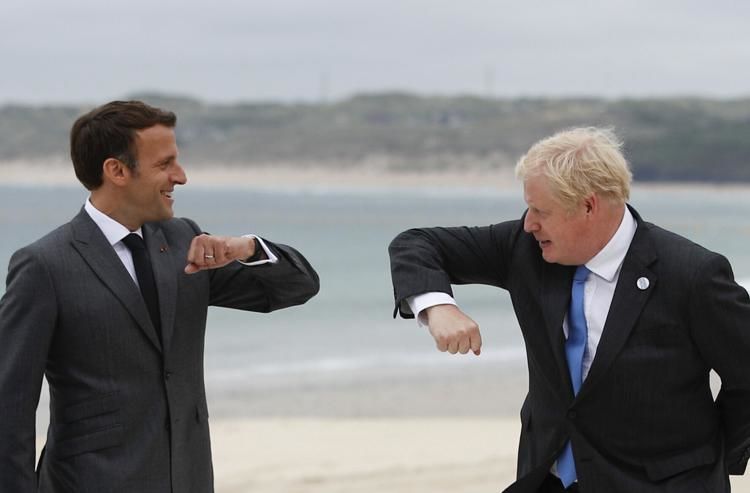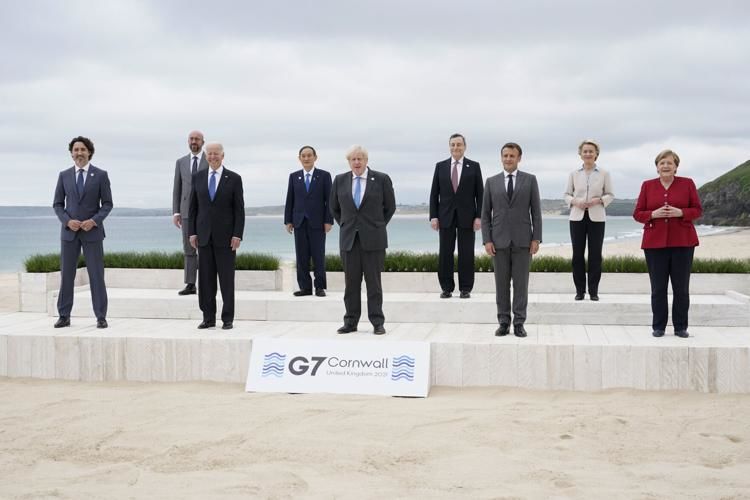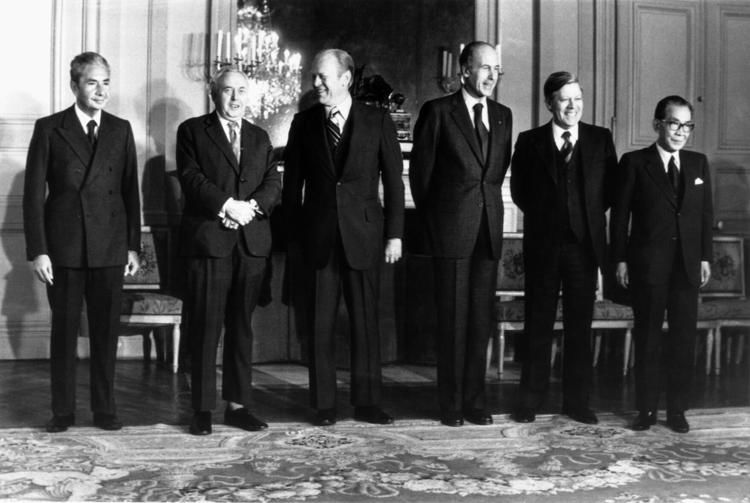
What's the G-7?
 British Prime Minister Boris Johnson, right,
greets French President Emmanuel Macron during arrivals for the G7
meeting at the Carbis Bay Hotel in Carbis Bay, St. Ives, Cornwall,
England, Friday, June 11, 2021. Leaders of the G7 begin their first of
three days of meetings on Friday, in which they will discuss COVID-19,
climate, foreign policy and the economy.
British Prime Minister Boris Johnson, right,
greets French President Emmanuel Macron during arrivals for the G7
meeting at the Carbis Bay Hotel in Carbis Bay, St. Ives, Cornwall,
England, Friday, June 11, 2021. Leaders of the G7 begin their first of
three days of meetings on Friday, in which they will discuss COVID-19,
climate, foreign policy and the economy.
The Group of 7 is an informal group of seven powerful democracies: Canada, France, Germany, Italy, Japan, the United Kingdom and the United States. The presidents of the European Commission and European Council also attend G-7 meetings because several of Europe’s largest countries are also members.
Membership, which is decided internally, hasn’t changed much since the group’s founding in 1975. At the time, it included only six countries, all of which still belong. Canada joined a year later. Russia joined as an eighth member in 1998, temporarily changing the group’s moniker to the G-8, but Russia was ousted after it annexed Crimea in 2014.
Together, these seven wealthy nations form the foundation of the modern global economy and the cooperative rules-based system on which it is built.
 Leaders of the G7 pose for a group photo on
overlooking the beach at the Carbis Bay Hotel in Carbis Bay, St. Ives,
Cornwall, England, Friday, June 11, 2021. Leaders from left, Canadian
Prime Minister Justin Trudeau, European Council President Charles
Michel, U.S. President Joe Biden, Japan's Prime Minister Yoshihide Suga,
British Prime Minister Boris Johnson, Italy's Prime Minister Mario
Draghi, French President Emmanuel Macron, European Commission President
Ursula von der Leyen and German Chancellor Angela Merkel.
Leaders of the G7 pose for a group photo on
overlooking the beach at the Carbis Bay Hotel in Carbis Bay, St. Ives,
Cornwall, England, Friday, June 11, 2021. Leaders from left, Canadian
Prime Minister Justin Trudeau, European Council President Charles
Michel, U.S. President Joe Biden, Japan's Prime Minister Yoshihide Suga,
British Prime Minister Boris Johnson, Italy's Prime Minister Mario
Draghi, French President Emmanuel Macron, European Commission President
Ursula von der Leyen and German Chancellor Angela Merkel.
Why the G-7 matters
Despite the decline, the economic might of G-7 nations remains undeniable, not least due to their collective position as countries at the forefront of technological innovation and industrial know-how. Moreover, G-7 economies are inextricably interwoven with global supply chains, which means that a policy change or economic shock in one G-7 country will, for better or worse, have ripple effects across the globe.
Ultimately, the G-7 may be the best hope for quick, decisive and meaningful policy action on pressing global problems.
While the G-7 doesn’t have the institutional clout of the United Nations, the World Trade Organization or NATO, it also doesn’t have their institutional red tape or bureaucracy.
And although the G-7 is a subset of the ascendant G20 – which also includes rising economic powerhouses China, India and Brazil – the G-7 has another advantage: it’s much easier to achieve consensus in an intimate group of similar nations than it is to find common ground among diverse nations with very different economic and political priorities.
 In this Nov. 17, 1975 file photo the six
heads of state and government attending Economic and Monetary summit
meeting at the Chateau de Rambouillet, West of Paris, pose for a group
portrait before the final session. From left: Premier Aldo Moro of
Italy, Premier Harold Wilson of the Great Britain, President Gerald Ford
of the United States, President Valery Giscard d'Estaing of France,
Chacellor Helmut Schmidt of West Germany and Premier Takeo Miki of
Japan. The G7 was originally a response by leaders of Western
democracies to the economic shocks and recession of the mid-1970s.
In this Nov. 17, 1975 file photo the six
heads of state and government attending Economic and Monetary summit
meeting at the Chateau de Rambouillet, West of Paris, pose for a group
portrait before the final session. From left: Premier Aldo Moro of
Italy, Premier Harold Wilson of the Great Britain, President Gerald Ford
of the United States, President Valery Giscard d'Estaing of France,
Chacellor Helmut Schmidt of West Germany and Premier Takeo Miki of
Japan. The G7 was originally a response by leaders of Western
democracies to the economic shocks and recession of the mid-1970s.
What the G-7 does
The world is facing profound challenges, from the devastation of the COVID-19 pandemic and climate change to authoritarianism and attacks on democracy.
None of these issues colors neatly within the lines of national borders. Countries need to cooperate to find solutions that do not simply kick the can to their neighbors.
An example of meaningful action by the G-7 is its June 5, 2021, announcement of an agreement on global minimum corporate tax rates, which marked a watershed moment in international taxation. If successful, the agreement could mean the end of tax havens and a dramatic shift in how companies record their profits around the world.










